|
|
|
Sort Order |
|
|
|
Items / Page
|
|
|
|
|
|
|
| Srl | Item |
| 1 |
ID:
100505


|
|
|
|
|
| Publication |
2010.
|
| Summary/Abstract |
This article analyses an emerging African trading community in Guangzhou, China. It is argued that migrant communities such as this one act as linguistic, cultural and economic bridges between their source communities and their host communities, even in the midst of tensions created by incidents such as immigration restrictions and irregularities. Socio-linguistic and socio-cultural profiles of this community are built, through questionnaire surveys and interviews, to address issues such as why Africans go to Guangzhou, which African countries are represented, what languages are spoken there, how communication takes place between Africans and Chinese, what socio-economic contributions Africans in Guangzhou are making to the Chinese economy, and how the state reacts to this African presence. Following from the argument that this community acts as a bridge for Africa-China relations it is suggested that both the Chinese and the African governments should work towards eliminating the harassment of members in this community by many Guangzhou law enforcement officials and instead harness the contributions of this community to promote Africa-China socio-economic relations.
|
|
|
|
|
|
|
|
|
|
|
|
|
|
|
|
| 2 |
ID:
100501
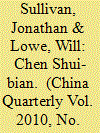

|
|
|
|
|
| Publication |
2010.
|
| Summary/Abstract |
Chen Shui-bian achieved an international reputation for his promotion of Taiwan independence. Whilst that reputation may have been well earned, the analyses on which this conclusion is based are frequently flawed in two ways. First, by using an undifferentiated notion of independence, they tend to conflate sovereignty with less threatening expressions of Taiwanese identity and pro-democracy discourse. Second, by failing to take into account the impact of immediate strategic context, analysts ignore a fundamental element of democratic political communication. In our empirical analysis of more than 2,000 of Chen's speeches, we seek to avoid both flaws by unpacking the concept of independence and taking into account Chen's strategic relationship with his primary audiences. Our findings challenge popular portrayals of Chen, but more importantly they have strong implications for policy makers and students of political rhetoric with regard to current and future ROC presidents.
|
|
|
|
|
|
|
|
|
|
|
|
|
|
|
|
| 3 |
ID:
100498
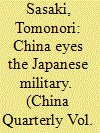

|
|
|
|
|
| Publication |
2010.
|
| Summary/Abstract |
This article represents the first attempt to examine the Chinese elite's threat perception of Japan using statistics to analyse what, if any, differences exist among the People's Liberation Army, the Chinese Ministry of Foreign Affairs and Chinese economic institutes. It seeks to answer two questions that have not previously been addressed in the literature. First, has there been a change in perception of the Japanese threat in these three sectors over time? And if so, what can we deduce about the causes of this change? This study finds that there have indeed been two major shifts in China's threat perception of Japan since the 1980s, one in the late 1980s and the other in the mid-1990s. It also finds that there were no differences between sectors as to the direction and timing of these shifts. It suggests that Japan's military build-up in the late 1980s and the strengthening of the US-Japan alliance from 1996 onwards are what prompted these shifts in China's threat perception.
|
|
|
|
|
|
|
|
|
|
|
|
|
|
|
|
| 4 |
ID:
100502
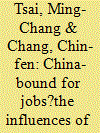

|
|
|
|
|
| Publication |
2010.
|
| Summary/Abstract |
Taiwan has long been recognized as a labour-absorbing society, but today approximately 3 per cent of its population is working in China, an increasingly important destination for regional immigration. In this article we go beyond conventional immigration economics to examine how social connections and ethnic politics affect Taiwanese motivations to move to China for employment. Results from a national random-sample survey conducted in 2005 are used to analyse the willingness and potentiality of Taiwanese to work in China. The findings indicate that besides human capital factors, social networks and political/ethnic identity offer insights to understanding migrations among Taiwanese, as well as why the vast majority have so little interest in going China-bound.
|
|
|
|
|
|
|
|
|
|
|
|
|
|
|
|
| 5 |
ID:
100499


|
|
|
|
|
| Publication |
2010.
|
| Summary/Abstract |
The aim of this article is to analyse China's engagement in global sport through an examination of the case of elite football. Although many studies exhibit a quite proper concern with the extent to which the deep structure of culture is affected by sports globalization, they generally fail to give significant consideration to the role of the state, because of excessive emphasis on other aspects of globalization such as commercialization, commodification and cultural homogenization. We attempt, therefore, to refocus on the role of the state and to investigate its relationship with global sport by adopting the theoretical framework of Held et al. (1999) as the main analytical tool for this study. By taking strategic approaches in the economic and cultural/ideological fields, the Chinese government has demonstrated, to some degree, its capacity to find effective ways to manage its relationship with global football. This was demonstrated particularly by the setting up of new governmental commercial agencies, updating sport and football regulations, and strengthening Chinese communist ideological education.
|
|
|
|
|
|
|
|
|
|
|
|
|
|
|
|
| 6 |
ID:
100500


|
|
|
|
|
| Publication |
2010.
|
| Summary/Abstract |
Over the last decade, rural township governments have been subjected to intensive streamlining and rationalization programmes. This article examines which ongoing reforms and processes are causing township governments to become "hollow shells," and explores the effects of "hollowing out" on township government leaders, staff and rural residents. While the aim of local government reform was to transform extractive township governments into "service-oriented" agencies, this article finds that the current logic of rural governance has produced township governments which are squeezed from above and below. From above, township leaders face the political imperatives of inspections, annual assessments, the need to attract industrial investment and an ongoing process of "soft centralization" by higher levels of government. From below, township staff are drawn out to the villages to enforce family planning policies and maintain social stability. Unprecedented numbers are working as "sent-down cadres" in villages where their capacity to deliver services has been weakened by village amalgamations and the lifting of agricultural taxes and fees. Despite significant boosts to rural health and education investment, rural residents still face a level of government that regards them as problems to be dealt with, rather than citizens to be served.
|
|
|
|
|
|
|
|
|
|
|
|
|
|
|
|
| 7 |
ID:
100497
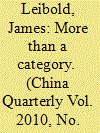

|
|
|
|
|
| Publication |
2010.
|
| Summary/Abstract |
Using the October 2008 slapping incident of historian Yan Chongnian ??? as a case study, this article attempts to contextualize and critically examine the articulation of Han supremacism on the Chinese internet. It demonstrates how an informal group of non-elite, urban youth are mobilizing the ancient Han ethnonym to challenge the Chinese Communist Party's official policy of multiculturalism, while seeking to promote pride and self-identification with the Han race (han minzu ???) to the exclusion of the non-Han minorities. In contrast to most of the Anglophone literature on Chinese nationalism, this article seeks to employ "Han" as a "boundary-spanner," a category that turns our analysis of Chinese national identity formation on its head, side-stepping the "usual suspects" (intellectuals, dissidents and the state itself) and the prominent role of the "foreign other" in Chinese ethnogenesis, and instead probing the unstable plurality of the self/othering process in modern China and the role of the internet in opening up new spaces for non-mainstream identity articulation.
|
|
|
|
|
|
|
|
|
|
|
|
|
|
|
|
| 8 |
ID:
100504


|
|
|
|
|
| Publication |
2010.
|
| Summary/Abstract |
Scholarship on factional warfare during the first two years of the Cultural Revolution has long portrayed a struggle between "conservative" factions that sought to preserve the status quo and "radical" factions that sought to transform it. Recent accounts, however, claim that the axis of political conflict was fundamentally transformed after the fall of civilian governments in early 1967, violating the central tenet of this interpretation. A close examination of Nanjing's abortive power seizure of January 1967 addresses this issue in some depth. The power seizure in fact was a crucial turning point: it removed the defenders of local authorities from the political stage and generated a split between two wings of the rebel movement that overthrew them. The political divisions among former rebel allies intensified and hardened in the course of tortuous negotiations in Beijing that were buffeted by confusing political shifts in the capital. This created a contest that was not between "conservatives" and "radicals" over the restoration of the status quo, but about the respective places of the rival radical factions in restored structures of authority.
|
|
|
|
|
|
|
|
|
|
|
|
|
|
|
|
| 9 |
ID:
100503
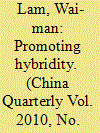

|
|
|
|
|
| Publication |
2010.
|
| Summary/Abstract |
This article traces the unique process of reconstructing the identity of the Macau Special Administrative Region and its people after the political resumption to China in 1999, and the political and economic significance of the reconstruction. As in other postcolonial contexts, identity is an arena of political contest where various discourses that embody re-appropriation of political traditions and legacies criss-cross. In Macau, the post-handover identity comprises the local, the national and the international components, with Macau characterized as a historical, colonial/cultural hybrid and economic object. In fact, the Macau identity after 1999 represents a re-appropriation of the image of colonial Macau propagated by the Portuguese administration since the 1980s. Also, identity making has been a process of incorporating instead of repressing or eliminating the identities of "the other," and building a stand-alone national identity is not the prime task in the reconstruction of an identity. Rather, multiple identity components are deliberately incorporated and promoted. The success of the process has fabricated Macau's relatively smooth reintegration with China and enhanced the legitimacy of its new government.
|
|
|
|
|
|
|
|
|
|
|
|
|
|
|
|
|
|
|
|
|